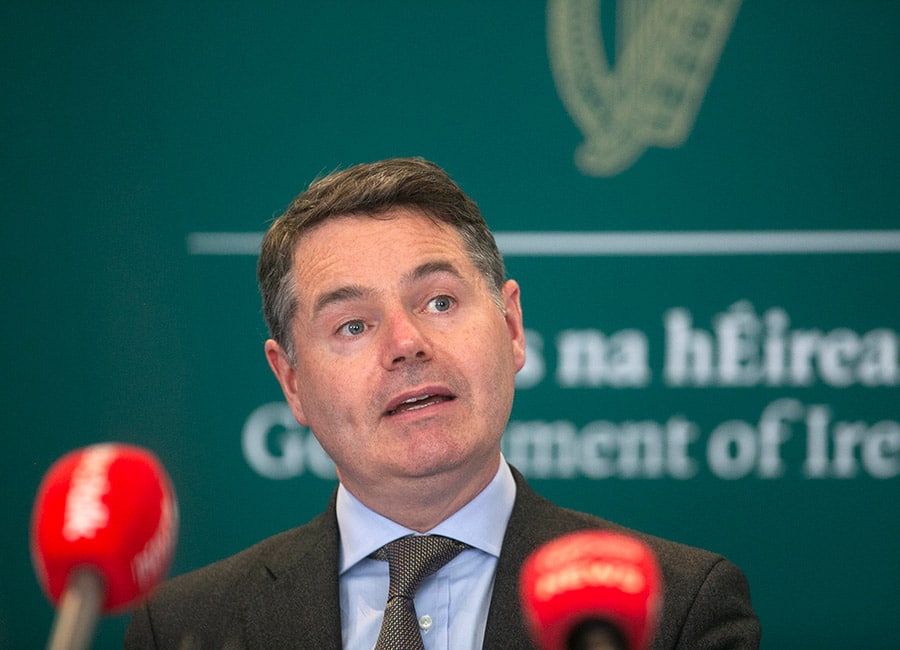Minister for Finance Paschal Donohoe has defended energy-draining data centres - despite two days of 'amber' warnings on the energy grid this week.
The Government has been under pressure from the opposition not to allow further development of data centres due to their large levels of energy consumption.
Consumption by data centres increased by almost one third last year, according to the Central Statistics Office.
The 'amber' warnings signal that there is a threat to the supply of electricity.
There are currently 70 data centres nationwide, which accounted for a greater share of energy consumption than rural homes across the country last year.
Speaking on RTÉ Radio's Morning Ireland yesterday, Mr Donohoe said that while data centres only create a small number of full-time jobs, they are crucial to major international companies based here.
He stressed that they are "hugely important to really large employers".
The Department of Enterprise estimates 30-50 permanent jobs are created per data centre.
Mr Donohoe said data centres are of "indirect huge importance to really large employers within our country, whose taxes and jobs are playing an invaluable part in our economic performance at the moment".
Many large tech companies, such as Google, Facebook and Twitter, have been drawn to Ireland by its low corporate tax rate of 12.5%.
Around 25% of the State's total tax take comes from corporation tax, with €8billion being collected in the first half of the year. However, half of this comes from just ten companies, illustrating how reliant and exposed our economy is to these corporations.
While the Government does not know the identities of these companies due to Revenue rules, it is likely they are predominately from the technology and pharmaceutical sectors.

Mr Donohoe said Ireland is able to offer companies "the ability to have the data that these companies need located within our country", alongside a skilled workforce employed by these firms.
On Wednesday, Sinn Féin environment spokesman Darren O'Rourke became the latest opposition member to call for a moratorium on data centres after planning permission was granted for one in Ennis, Co. Clare.
His comments came after Eirgrid issued amber alerts "due to low wind, limited electricity imports, and forced outages at a number of generators".
Mr O'Rourke commented: "It is incredible that this is continuing, while the threat of blackouts hangs over the population.
"If we are having amber alerts in mid-summer, what will the situation be like in mid-winter, when light and heating demand increases due to the dark and cold?"
Social Democrats environment spokeswoman Jennifer Whitmore called for a moratorium on the development of data centres in September last year, saying Ireland risked "reputational damage" over the failure to provide energy security in the country.
Mr Donohoe acknowledged that the country needed to "make progress far quicker than within a decade," when it came to progressing with generating more renewable energy.
"If we end up with less renewable energy in the future than we will need or that we have now, that is an issue that I have to consider as seriously as the demands that many are now placing upon me to find new sources of tax revenue," he said.
Gerry Duggan, chartered engineer fellow at the Irish Academy of Engineering, said that data centres should be able to supply power to the national grid. He remarked: "Data centres have a very large amount of stand-by generation capacity (through diesel-fired generators) that would cover any potential shortfall."
Data centres do not currently send power they generate to the grid.
Mr Duggan believes one possible solution would be to place a significant levy on data centres at peak times to encourage them to use their own power generation and reduce the burden on the grid. "A system where it is expensive to buy electricity from the market at peak times would force them to use their generators," he said.
However, he noted that the data centres would not be in favour of such a move.
"They say they use 100% renewable and are reluctant to use the generators," Mr Duggan added.











